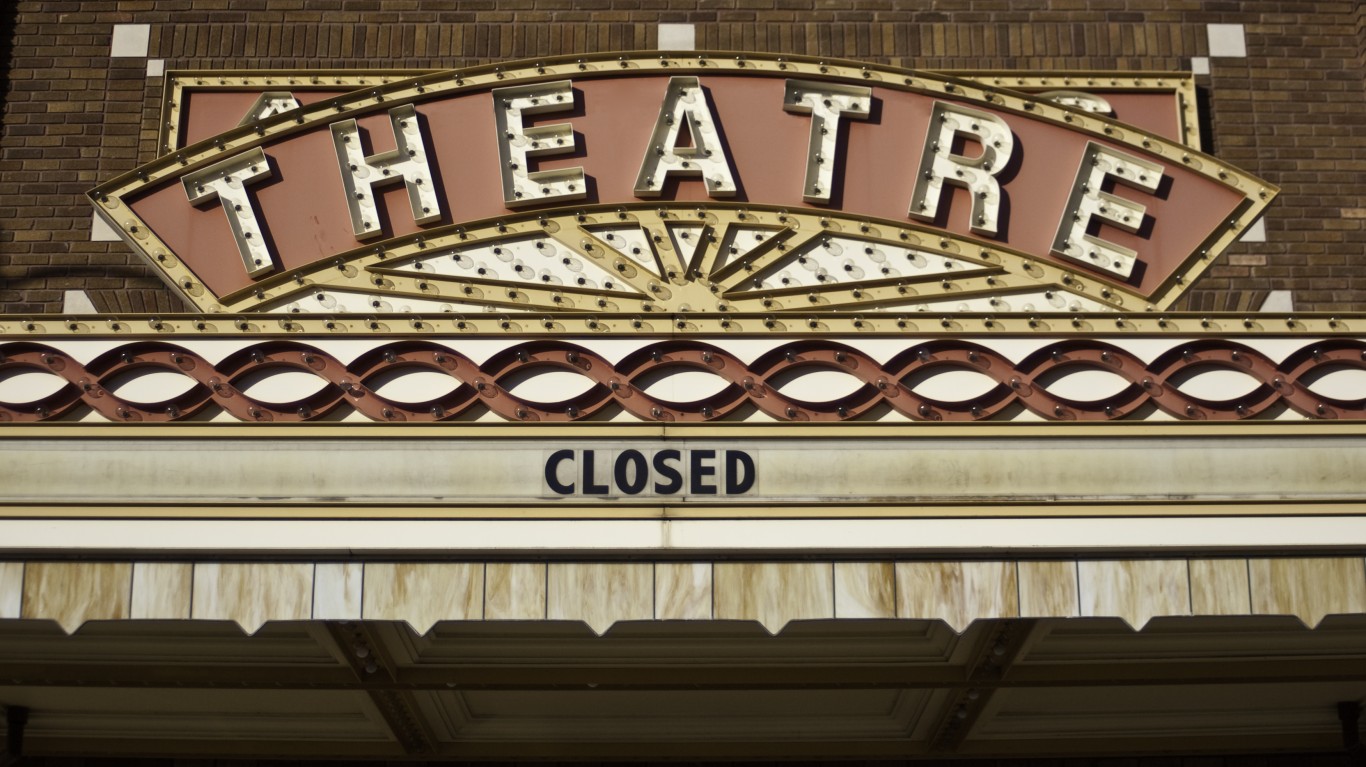
It’s been a wild ride in 2020. The greatest bull market ever turned into the fastest bear market ever, and the worst recession since the Great Depression was seen as the coronavirus turned into the COVID-19 pandemic. Throw in trillions of stimulus dollars and the fastest race for curing or vaccinating against COVID-19 and there are parts of the economy doing great as the stock market hit all-time highs once more.
It turns out that the economic recovery has been very selective. The all-time highs in stocks are reflective of how many of the companies are winning, though frequently at the expense of other companies. 24/7 Wall St. has tracked a group of companies that have simply refused to participate in the stock market upside. We looked beyond the obvious pain points within oil and gas and within travel, and many stocks are just refusing to participate in very much upside.
In an effort to avoid companies unknown to the market, companies with market caps of $500 million to over $1 billion were preferred. If they fell short, that’s because things have gone so wrong. On top of energy and travel, we also screened out the companies in biotech or emerging medical technology that may have seen a trial failure because those companies may have little to no future.
24/7 Wall St. would remind its readers that so-called cheap value stocks often are cheap for a reason. Some of these companies have the pandemic to blame, but some of the value stocks are also value traps. While there are nine prominent stocks featured here, some runners-up also have been included.
Aurora Cannabis Inc. (NYSE: ACB) may still have a $530 million market cap, but at $4.38 a share, this stock is effectively at a 52-week low and is down about 90% from a year ago. With profitability concerns mounting, it no longer seems to matter that the Canadian cannabis company is vertically integrated in marijuana. With much of the sector in trouble, Tilray Inc. (NASDAQ: TLRY) gets a runner-up nod here, even if it was up 5% on the day, because its shares were down 70% year to date, and the cannabis stock sector’s implosion has been nearly unilateral. Even the ETFMG Alternative Harvest ETF (NYSEARCA: MJ) is barely above its closing lows in March.
Cinemark Holdings Inc. (NYSE: CNK) finds itself in an inoperable position. With Regal shutting operations, it seems there is little to no hope to draw movie viewers back in. Even those who would brave the pandemic and go sit in a theater find themselves with the dilemma that all the movies that have been filmed for large audiences have been delayed again and again. Cinemark is down about 75% year to date and still has a $990 million market cap. Rival AMC Entertainment Holdings Inc. (NYSE: AMC) is not in much better shape, and its $439 million market cap is still down nearly 50% so far this year.
Empire State Realty Trust Inc. (NYSE: ESRT) certainly is not the only office building real estate investment trust (REIT) that is feeling no love in 2020. What is hurting so bad here is that it owns and runs office and retail properties in Manhattan and the greater New York City metro area. Its flagship property is the famous Empire State Building. Companies are not exactly feeling an urgency to run back into their offices in New York City, so the retail landscape is brutal there, and many people in the country feel the local politicians are destroying the city. The REIT even has had to suspend its dividend, and it is hard to judge whether the liabilities and lack of cash flows can support the $1.9 billion market cap today. Empire State Realty’s share price is still lower than when the March lows were seen, and the stock price is down over 50% in 2020.
Macy’s Inc. (NYSE: M) may have the pandemic to blame, just like so many other retailers, but its woes, at about $6.00 a share, are worse than the 65% year-to-date drop would imply. Macy’s has been the poster child of being on the wrong side of the retail apocalypse for years, with no growth and pre-pandemic sales still lower than they were three years earlier. Macy’s was close to a $17 stock at the start of 2020, but that is down from a peak of almost $70 back in 2015. New management, permanent store closures, temporary store closures, negative sales trends and even a weak snapback for calendar year 2021 all beg the question of whether this anchor tenant for retail shopping malls, with what is now less than a $2 billion market cap, even needs to exist for most Americans a decade from now.
Molson Coors Beverage Co. (NYSE: TAP) may have been up on Wednesday after a positive valuation recognition by an analyst upgrade, but this beer maker just has not seen a recovery in its stock like other alcoholic beverage companies (Anheuser-Busch InBev, Boston Beer, Constellation Brands and so on). With a market cap of nearly $8 billion, the stock is barely above the plunge-depth lows of March, due to very recent buying. The stock trades at only about 10 times expected earnings, and that is based on even lower earnings than in 2019, without a full earnings recovery to pre-pandemic levels even expected in 2021.
Peabody Energy Corp. (NYSE: BTU) may have a low $200 million market cap, but that’s what happens when a stock falls 80% year to date and even worse compared to the past. Being in the coal business is no fun place, and the future looks bleak for the industry. It even seems fair to ask how this company will be able to operate in the future, and it appears that there are no Buy ratings from analysts at all. Maybe this is a story where you go back in time to when stockbrokers would pitch stocks to investors: “So, there is this great coal company you should consider…”
Revlon Inc. (NYSE: REV) currently has a $340 million market cap, but it is down over 70% from its January highs. As the work-from-home and staying-in trends have remained for a large portion of the country (and the world), it is hard to imagine that makeup sales are happening at all. Revlon’s stock is under the March selling lows. This is just another casualty of COVID-19, and it is in great need of a vaccine or a cure like others.
Spirit AeroSystems Holdings Inc. (NYSE: SPR) is not at fault for its woes. With Boeing as the main customer and with airline manufacturing now on hold until the airlines can get back on track, it is a hard time to be in the business of manufacturing fuselage, propulsion and wing systems. Despite the $18.85 per share being up from a low under $14, this stock effectively has traded sideways after losing half of its value since June. To make matters worse, Spirit’s stock is down about 75% year to date.
Wells Fargo & Co. (NYSE: WFC) remains the bank that investors want to avoid. Its $24.75 share price is barely up 10% from its 52-week low, and the stock is down 55% so far in 2020. After a major dividend cut and continued scrutiny, even the great Warren Buffett has thrown in the towel on what was once one of the two safest and most prestigious banks in America. Scandals don’t come without costs, and questions remain about how it will recover as well as the other major banks. With profitability not even assured in 2020, the Refinitiv consensus of $2.01 in earnings per share in 2021 is still just half of the $4.05 per share from 2019.
Is Your Money Earning the Best Possible Rate? (Sponsor)
Let’s face it: If your money is just sitting in a checking account, you’re losing value every single day. With most checking accounts offering little to no interest, the cash you worked so hard to save is gradually being eroded by inflation.
However, by moving that money into a high-yield savings account, you can put your cash to work, growing steadily with little to no effort on your part. In just a few clicks, you can set up a high-yield savings account and start earning interest immediately.
There are plenty of reputable banks and online platforms that offer competitive rates, and many of them come with zero fees and no minimum balance requirements. Click here to see if you’re earning the best possible rate on your money!
Thank you for reading! Have some feedback for us?
Contact the 24/7 Wall St. editorial team.
 24/7 Wall St.
24/7 Wall St.


